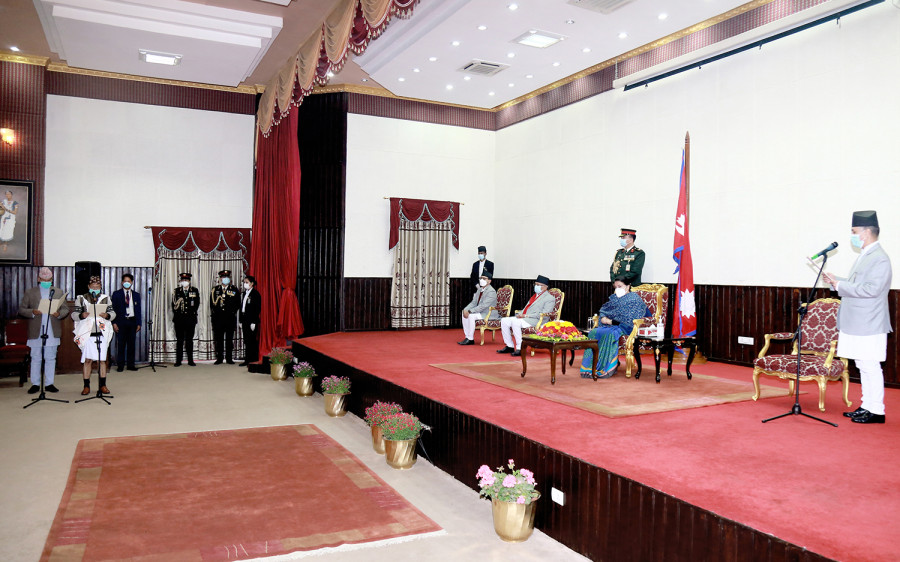National
Appointments to constitutional bodies receive widespread flak
Questions raised over Nepali Congress’ role as party supporters feature on list of appointees.
Anil Giri
Major political parties have opposed the swearing in of over two dozen individuals appointed to various positions in different constitutional bodies, and called the move a step towards totalitarianism.
A total of 32 individuals appointed to various constitutional bodies, including the Commission for the Investigation of Abuse of Authority and the National Human Rights Commission, were administered their oath of office and secrecy on Wednesday at the President’s Office.
The appointments were made on December 15 by a meeting of the Constitutional Council after the KP Oli government introduced an ordinance to amend the Constitutional Council Act—questions over the legality of the ordinance remain sub-judice.
According to the constitution, nominees to positions in constitutional bodies need to face a parliamentary hearing. But due to the dissolution of the House of Representatives, the process was skipped.
In response to the appointments, the Nepal Communist Party faction led by Pushpa Kamal Dahal and Madhav Kumar Nepal have called for nationwide protests on Thursday while the Nepali Congress has criticised the government for taking steps towards totalitarianism.
The Dahal-Nepal faction also announced in haste a nationwide strike on Thursday to protest the appointments. “The general strike is against Prime Minister Oli’s fascist attitude,” said party leader Pampha Bhusal adding that the strike will be observed peacefully.
Though the Nepali Congress has opposed the move, some individuals considered to be allies of the Nepali Congress also took their oath of office and secrecy on Wednesday—raising suspicion over the party’s role in the process.
“We have decided to intensify protests against the government”, Nepali Bishwo Prakash Sharma, spokesperson for the Nepali Congress wrote on Twitter. Appointments in constitutional bodies have shown the government is heading towards totalitarianism, he added.
“We have concluded that we need to intensify the movement against totalitarianism..The Nepali Congress is against the violation rule of the law.”
Jai Bahadur Chand, considered an ally of Congress President Sher Bahadur Deuba, was appointed as commissioner of the Commission for the Investigation of Abuse of Authority and Surya Prasad Dhungel, also considered a Congress sympathiser, was appointed member of the National Human Rights Commission.
Chand, who was additional inspector general of Nepal Police, was appointed the chief of Nepal Police by then Sher Bahadur Deuba government in February, 2017—but his appointment was struck down by the Supreme Court. Deuba, during a recent meeting of the Constitutional Council, reportedly recommended Chand for the position under the “Congress quota”.
“I had opposed Chand’s recommendation when it was brought up at the party’s central working meeting,” Gagan Thapa, a central working committee member said. “What affection led our party president to give him an appointment, I do not know.”
Though some individuals recommended by the Nepali Congress took their oath of office on Wednesday, some party leaders and experts have expressed concern over why the party did not demand that the government put the appointments on hold.
“We know these appointments were made after muzzling the constitution. But why did we think one man was so important to us or our party president? This is certainly not going to do us good,” said Thapa.
In addition to the controversy related to the Supreme Court case against the Constitutional Council ordinance, another controversy surfaced on Sunday after Speaker Agni Prasad Sapkota, also a member of the council, rejected the appointments.
The meeting of the Constitutional Council made the recommendations to appoint the 32 individuals to various positions on December 15. But the recommendations were not made public until the dissolution of the House on December 20.
“It is widely believed that Nepali Congress upholds the principles of democracy, rule of law, value and ethics. “But these days, we have not seen the party do so,” said Harihar Birahi, a senior journalist who has been following Nepali Congress for decades. “This is a matter of concern.”
“Why does the Nepali Congress need to support this government? This constitution was delivered by the constituent assembly,” said Birahi. “So is it not the responsibility of the Nepali Congress to protect it?”
Meanwhile, Janata Samajbadi Party has also opposed the swearing-in of various individuals to different positions in constitutional bodies, though the party—like Nepali Congress—remains divided over the issue of the dissolution of the House of Representatives.
“The government has made the wrong moves. So we do not agree with the process,” said Keshav Jha, a JSP leader. Though the party hasn’t come up with an official statement, Jha said the decision to make the appointments in constitutional bodies was not acceptable to the party.




 22.12°C Kathmandu
22.12°C Kathmandu














